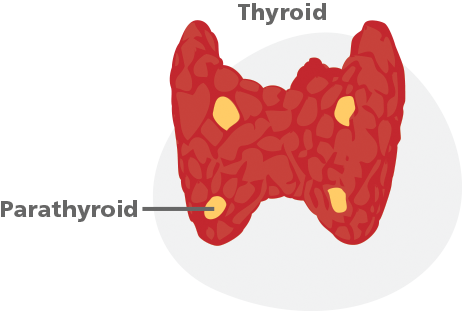Parathyroid Gland
There are typically four parathyroid glands, which are usually found on the back side of the thyroid. The thyroid gland regulates the body’s metabolism, while the parathyroid glands regulate calcium levels. The thyroid and parathyroid are next to one another but are not related to one another. The sole purpose of secreting parathyroid hormone is to regulate the calcium level in our bodies. Calcium is an extremely important primary element that causes muscles to contract, and calcium levels are very important to the normal conduction of electrical currents along nerves. Therefore, the parathyroid hormone is essential in controlling nerves and muscles to function properly.

Parathyroid Hormone
Parathyroid hormone (PTH) is the main hormone produced and regulates the cells of your bones by causing them to release calcium into the bloodstream. We store many pounds of calcium in our bones which are readily available to the rest of the body under the regulation of PTH. PTH also regulates how much calcium is absorbed from your diet and the amount of calcium excreted by your kidneys. PTH increases the formation of active vitamin D made in the kidney and this active vitamin D increases intestinal calcium and phosphorus absorption. You can see there are several levels of regulation of the calcium in your bloodstream and the parathyroid hormone keeps the blood level very stable.
Diseases and Disorders of the Parathyroid
When the parathyroid releases too much or too little PTH, it adversely affects your body in a variety of ways.
Hyperparathyroidism
The most common disease of the parathyroid glands is overproduction of parathyroid hormone or hyperparathyroidism, which is characterized by excess PTH and typically causes high blood calcium levels and high levels of calcium in the urine. In other words, the parathyroid glands continue to make large amounts of PTH even when the calcium level is high, and
they should not be making the hormone at all. When the PTH levels are high, calcium is mobilized from the bones and commonly causes the calcium to increase in the bloodstream. There are several causes of hyperparathyroidism. (Link to Hyperparathyroidism)
Hypoparathyroidism
Hypoparathyroidism is due to inadequate parathyroid hormone production. This leads to decreased blood levels of calcium (hypocalcemia) and increased levels of blood phosphorus (hyperphosphatemia). This is a rare condition and most commonly occurs because of damage or removal of parathyroid glands during parathyroid or thyroid surgery, but may also occur with other clinical conditions. (Link to Hypoparathyroidism)
Osteoporosis
When one or more of the parathyroid glands is overactive, it releases too much PTH. This causes your bones to release calcium constantly into the bloodstream. Without enough calcium in your bones, they lose their density or hardness and cause an increased risk of fractures to the bone. Osteoporosis can be caused by this loss of calcium and bone density. (Link to Osteoporosis)
![]()












